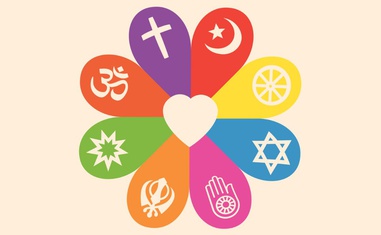The views expressed in our content reflect individual perspectives and do not represent the authoritative views of the Baha'i Faith.
An essayist on an interfaith website criticized Baha’i involvement with the United Nations, based on what she framed as the Baha’i teachings about who and what would create world unity and peace.
Her criticism — based on several misconceptions, not just about what the Baha’i Faith teaches but what Christ taught — deserves a reply.
At one point in her essay, the woman I’ll call “Jen” explained, mistakenly, what she thinks Baha’is believe. She wrote:
… there should be no tolerance for educational institutions and initiatives, or media policies and programs that promote intolerant attitudes and behaviors. Remember, as proselytizing to others, claiming an exclusive path to salvation, or condemning a lifestyle like homosexuality is deemed intolerant, this would apply to private religious schools and quite possibly churches.
RELATED: My Neighborhood Wonders: Why Can’t We Just Teach Goodwill?
She did not cite any source for these ideas, but I reminded her of what I’d said earlier, that Baha’i laws apply to Baha’is alone and are never to be forced on anyone else. This is in accordance with a standard that exists in all revealed religions and is a logical extension of the twin Greatest Commandments given by both Moses and Christ. In Matthew 22:35-40, Christ clarified the answer:
… Master, which is the great commandment in the law?
Jesus said unto him, Thou shalt love the Lord thy God with all thy heart, and with all thy soul, and with all thy mind. This is the first and great commandment. And the second is like unto it, Thou shalt love thy neighbour as thyself. On these two commandments hang all the law and the prophets.
In Luke 10:25-37, Christ memorably invoked that commandment to answer a profound question: How may I inherit eternal life? After assuring the young questioner that eternal life is inherited by obedience to the Greatest Commandment — “Do this and you shall live” — Christ followed up with an example in which tolerance for extreme differences is central. He told the story of a wounded Jew who, after being ignored by two Jewish priests, is rescued by a hated Samaritan. At that time, Jews and Samaritans both believed themselves to be the Chosen People and had zero tolerance for each other. Yet, Christ has the Samaritan saving the Jew’s life.
A chief feature of this story is that though the reasons for the priests’ avoiding contact with the injured man are ritual and doctrinal purity, neither the rescued Jew nor his rescuer speaks to the other of ancestral intolerance or admonishes him to repent and convert. There is no sermonizing, only compassion — a compassion that is, as Christ emphasizes, in conflict with Jewish religious law.
In the Parable of the Good Samaritan, Jesus isn’t just promoting tolerance of differences in worldview, religion, moral beliefs, or ethnicity. He is telling the young scholar — and by extension, anyone who would follow him — to not just tolerate but love this neighbor, whom they may consider sinful, or apostate, or heretical, or unclean.
I asked Jen to understand that Baha’is are as dedicated to protecting their beliefs from intolerance as we are our own. I noted that she had quoted a Baha’i statement to the UN that speaks of: “… a profound transformation in attitudes and behaviors.” Attitudes and behaviors can only be transformed through a change of heart, and a change of heart must come from the individual’s desire to change. It cannot be brought about by force from without. Remember the Apostle Paul’s assertion in 2 Corinthians 3:18 that:
“We all, with unveiled face, beholding as in a mirror the glory of the Lord, are being transformed into the same image from glory to glory …”
That’s one of the many reasons the Baha’i International Community works within all international frameworks to peacefully ensure religious tolerance — for Christians as much as for any other group. Because Baha’is are persecuted for their beliefs in several countries, we know firsthand how painful and deadly religious intolerance can be.
In her remarks, Jen also paraphrased a “Baha’i proposal” as saying: “only those religious leaders who make it clear to their followers that prejudice, bigotry, and violence have no place in the life of a religious person should be invited to participate in the work of this body.” It wasn’t clear what she meant by “this body” and I found her comments about this paradoxical because they implied she thought that in order to be a believer in Jesus, one must condone prejudice, bigotry, and violence in his name.
“I hope you don’t believe this,” I told her and explained that the Baha’i statement means simply what it says: that any work done in the service of unifying mankind cannot hope to succeed if it is done in a spirit of prejudice, bigotry, and violence.
Jesus Christ gave humanity very specific instructions about how one lives according to his teachings, as in this passage from Luke 6:27-39:
You have heard that it was said, ‘You shall love your neighbor and hate your enemy.’ But I say to you who listen: Love your enemies, do good to those who hate you, bless those who curse you, pray for those who mistreat you. If anyone hits you on the cheek, offer the other also. … If you love those who love you, what credit is that to you? Even sinners love those who love them. If you do good to those who are good to you, what credit is that to you? Even sinners do that. … But love your enemies, do good, and lend, expecting nothing in return. Then your reward will be great, and you will be sons of the Most High. For He is gracious to the ungrateful and evil. Be merciful, just as your Father also is merciful. Do not judge, and you will not be judged. Do not condemn, and you will not be condemned. Forgive, and you will be forgiven. … For with the measure you use, it will be measured back to you.
RELATED: Refugees: A New Parable of the Good Samaritan
This spirit — the spirit of Christ — echoes from age to age, finding ever more emphatic and explicit expression in the Baha’i teachings:
Act in accordance with the counsels of the Lord: that is, rise up … with such qualities, as to endow the body of this world with a living soul, and to bring this young child, humanity, to the stage of adulthood. So far as ye are able, ignite a candle of love in every meeting, and with tenderness rejoice and cheer ye every heart. Care for the stranger as for one of your own; show to alien souls the same loving kindness ye bestow upon your faithful friends. Should any come to blows with you, seek to be friends with him; should any stab you to the heart, be ye a healing salve unto his sores; should any taunt and mock at you, meet him with love…. Perchance such ways and words from you will make this dusty earth turn heavenly … so that war and strife will pass and be no more, and love and trust will pitch their tents on the summits of the world. Such is the essence of God’s admonitions …In light of these references, Jen’s assertion about tolerance gave me pause, prompting me to wonder: if the Spirit of Christ is love — even of our enemies and those we feel inclined to despise — isn’t the spirit of antichrist intolerance and hatred?

















Comments
Sign in or create an account
Continue with Facebookor